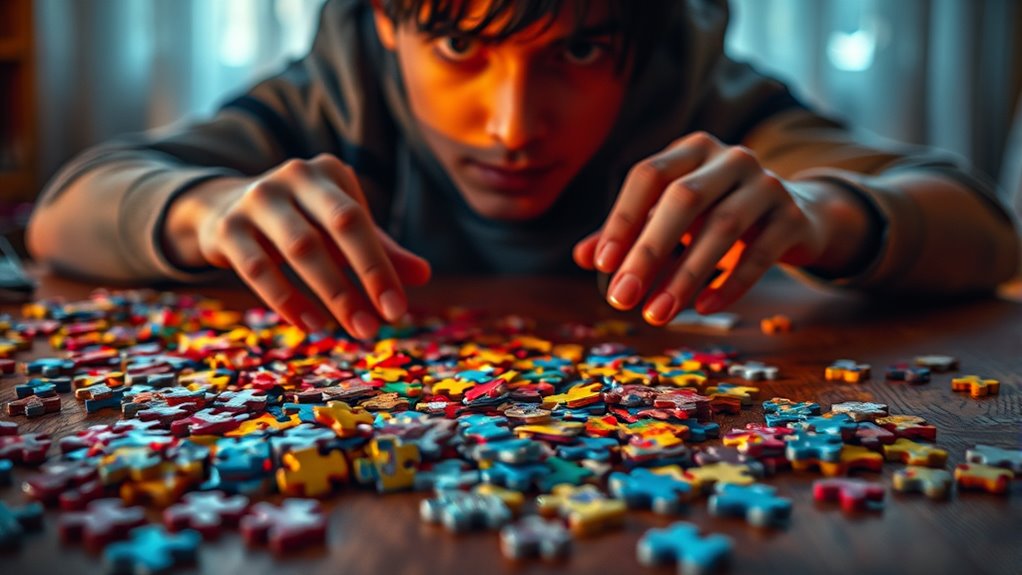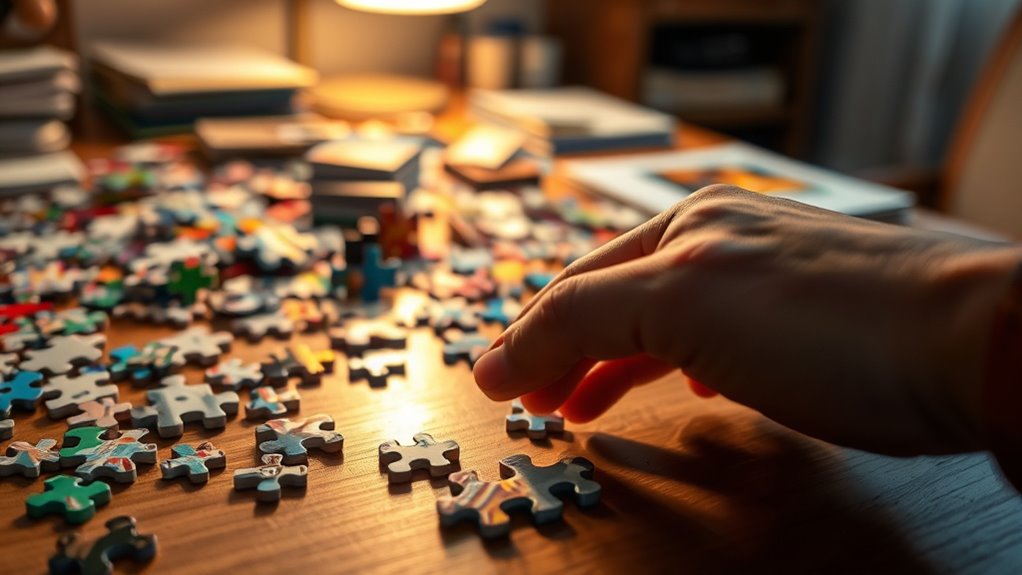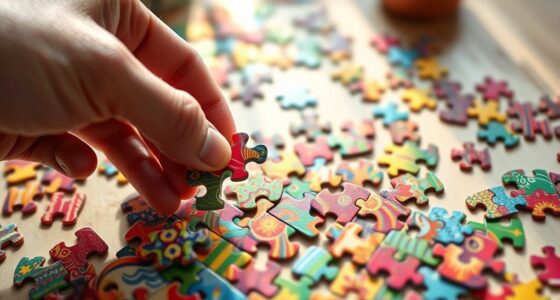Puzzle addiction happens because your brain releases dopamine when you solve puzzles, giving you feelings of pleasure and reward. This reinforces your desire to keep solving, possibly making it a primary source of that mix of satisfaction and excitement. As you chase these highs, your motivation can become compulsive, leading to overuse and imbalance in your life. To understand how these powerful triggers work and how to stay balanced, keep exploring the psychology behind it.
Key Takeaways
- Puzzle solving triggers dopamine release, reinforcing behavior and creating cravings for the pleasurable feelings associated with success.
- The neurochemical reward system encourages repeated engagement, potentially leading to compulsive or addictive puzzle activity.
- Successful puzzle completion enhances feelings of achievement and mastery, fueling motivation and emotional reinforcement.
- Puzzles provide stress relief and psychological control, which can become addictive as a coping mechanism.
- Overreliance on puzzle-solving for stimulation and pleasure may disrupt life balance, increasing risk of addictive behaviors.

Puzzle addiction isn’t just a harmless hobby; it taps into deep psychological needs for challenge, mastery, and relief from stress. When you get immersed in solving puzzles, your brain responds in powerful ways, primarily through neurotransmitter impact. As you piece together complex images or patterns, your brain releases dopamine, the feel-good chemical associated with pleasure and reward. This surge reinforces your behavior, making you want to continue solving, chasing that satisfying hit of accomplishment. Over time, this process can create a cycle where puzzle-solving becomes a primary source of dopamine, fostering a craving for that rewarding feeling and deepening your engagement.
This neurochemical response plays a significant role in cognitive enhancement. When you work on puzzles, your brain actively strengthens neural pathways involved in problem-solving, memory, and spatial reasoning. This stimulation not only boosts your immediate cognitive performance but can also lead to lasting improvements in mental agility. As you repeatedly challenge yourself with increasingly difficult puzzles, your brain adapts, becoming more efficient at processing complex information and recognizing patterns. This ongoing mental exercise can give you a sense of progress and mastery, which further fuels your motivation to keep solving.
Your psychological needs for challenge and mastery are deeply intertwined with how puzzles impact your mind. When you succeed at solving a difficult puzzle, you experience a sense of achievement that satisfies your desire for competence. This feeling is reinforced by the release of neurotransmitters like dopamine, which makes you feel motivated and it’s essential to tackle the next challenge. Conversely, the temporary relief from stress that puzzles provide makes them especially appealing during anxious or overwhelmed moments. The act of focusing intensely on a puzzle diverts your attention away from worries, giving you a psychological reprieve and a sense of control. Additionally, understanding the mindfulness aspect of engaging with puzzles can help you enjoy this activity in a balanced way, preventing it from becoming compulsive.
However, this powerful combination of neurotransmitter impact and cognitive enhancement can also lead to problematic patterns if unchecked. The pursuit of dopamine-driven rewards might cause you to prioritize puzzle-solving over other responsibilities or social interactions. Over time, this can contribute to compulsive behaviors, where you seek the mental stimulation and emotional highs from puzzles at the expense of balance in your life. Understanding this psychological dynamic helps you recognize why puzzles can be so addictive and why it’s essential to maintain moderation while enjoying their benefits. Ultimately, your brain’s response to puzzles underscores their capacity not just as a pastime, but as a potent tool for mental engagement—and, for some, a challenge they find hard to put down.
Frequently Asked Questions
Can Puzzle Addiction Negatively Impact Mental Health?
Yes, puzzle addiction can negatively impact your mental health. You might develop emotional dependency on solving puzzles for comfort, which can lead to increased stress or anxiety when you’re unable to engage. It could also cause social withdrawal, as you spend excessive hours alone working on puzzles instead of interacting with others. Over time, these issues might worsen, affecting your overall well-being and making it harder to maintain a balanced life.
What Are Common Signs of Puzzle Obsession?
You might notice signs of puzzle obsession when you constantly seek brain engagement through puzzles, even at the expense of other activities. You may feel an emotional attachment to completing each puzzle and struggle to stop, despite knowing it’s affecting your daily life. If you find yourself obsessively thinking about puzzles or feeling anxious when you’re unable to work on them, these are clear indicators of an unhealthy attachment.
How Does Puzzle Addiction Compare to Other Behavioral Addictions?
Puzzle passion pushes past typical pleasures, paralleling other behavioral addictions through shared motivation factors like stress relief or achievement. You might find yourself fixated, feeling compelled to complete puzzles despite disruptions. The addiction mechanisms involve dopamine-driven rewards and reinforcement, making it hard to break free. While less destructive than some addictions, puzzle obsession can still dominate your days, demanding awareness and mindful moderation to prevent persistent problems.
Are There Age Groups More Prone to Puzzle Addiction?
You might find that teenagers and young adults are more prone to puzzle addiction due to their developmental tendencies for seeking new challenges and stimulating activities. Social influences, like friends who enjoy puzzles or online communities, can also heighten your engagement. As you grow older, you may become less susceptible because of shifting priorities or decreased novelty. Recognizing these factors helps you understand your puzzle habits better and maintain a healthy balance.
Can Puzzle-Solving Improve Cognitive Functions Long-Term?
Yes, puzzle-solving can lead to long-term cognitive enhancement. When you engage in brain training through puzzles, you challenge your mind, strengthening neural connections and improving problem-solving, memory, and attention skills. The more consistently you practice, the more noticeable these benefits become over time. Don’t underestimate the power of a well-crafted puzzle—each session could be the key to sharpening your mind for years to come.
Conclusion
So, next time you find yourself glued to that puzzle, remember—you’re not just solving pieces, you’re releasing a whirlwind of obsession that could swallow your entire day! Your brain’s dopamine rush is like a fireworks show in your mind, blinding you to everything else. Puzzle addiction isn’t just a hobby; it’s a magnetic force pulling you into a vortex of endless pieces and impossible deadlines. Stay aware before your life turns into one giant, never-ending jigsaw.









